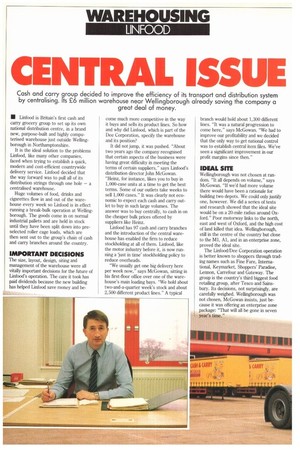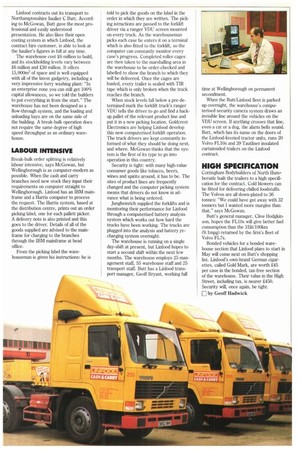CENTRAL ISSUE
Page 44

Page 45

If you've noticed an error in this article please click here to report it so we can fix it.
• Linfood is Britain's first cash and carry grocery group to set up its own national distribution centre, in a brand new, purpose-built and highly computerised warehouse just outside Wellingborough in Northamptonshire.
It is the ideal solution to the problems Linfood, like many other companies, faced when trying to establish a quick, modern and cost-efficient countrywide delivery service. Linfood decided that the way forward was to pull all of its distribution strings through one hole — a centralised warehouse.
Huge volumes of food, drinks and cigarettes flow in and out of the warehouse every week so Linfood is in effect running a break-bulk operation at Wellingborough. The goods come in on normal industrial pallets and are held in stock until they have been split down into preselected roller cage loads, which are then sent out to the group's chain of cash and carry branches around the country.
IMPORTANT DECISIONS
The size, layout, design, siting and management of the warehouse were all vitally important decisions for the future of Linfood's operation. The care it took has paid dividends because the new building has helped Linfood save money and be come much more competitive in the way it buys and sells its product lines. So how and why did Linfood, which is part of the Dee Corporation, specify the warehouse and its position?
It did not jump, it was pushed. "About two years ago the company recognised that certain aspects of the business were having great difficulty in meeting the terms of certain suppliers," says Linfood's distribution director John McGowan. "Heinz, for instance, likes you to buy in 1,000-case units at a time to get the best terms. Some of our outlets take weeks to sell 1,000 cases." It was clearly not economic to expect each cash and carry outlet to buy in such large volumes. The answer was to buy centrally, to cash in on the cheaper bulk prices offered by suppliers like Heinz.
Linfood has 97 cash and carry branches and the introduction of the central warehouse has enabled the firm to reduce stockholding at all of them. Linfood, like the motor industry before it, is now running a 'just in time' stockholding policy to reduce overheads.
"We usually get one big delivery here per week now," says McGowan, sitting in his first-floor office over one of the warehouse's main loading bays. "We hold about two-and-a-quarter week's stock and about 2,500 different product lines." A typical branch would hold about 1,300 different lines. "It was a natural progression to come here," says McGowan. "We had to improve our profitability and we decided that the only way to get national control was to establish central item files. We've seen a significant improvement in our profit margins since then."
IDEAL SITE
Wellingborough was not chosen at random. "It all depends on volume," says McGowan. "If we'd had more volume there would have been a rationale for building two depots. We could only justify one, however. We did a series of tests and research showed that the ideal site would be on a 20-mile radius around Oxford." Poor motorway links to the north, east and west of Oxford, and the high cost of land killed that idea. Wellingborough, still in the centre of the country but close to the Ml, Al, and in an enterprise zone, proved the ideal site.
The Linfood/Dee Corporation operation is better known to shoppers through trading names such as Fine Fare, International, Keymarket, Shoppers' Paradise, Lennon, Carrefour and Gateway. The group is the country's third biggest food retailing group, after Tesco and Sainsbury. Its decisions, not surprisingly, are carefully weighed. Wellingborough was not chosen, McGowan insists, just because it was offering an enterprise zone package: "That will all be gone in seven Linfood contracts out its transport to Northamptonshire haulier C Butt. According to McGowan, Butt gave the most professional and easily understood presentation. He also likes their open costing system in which Linfood, the contract hire customer, is able to look at the haulier's figures in full at any time.
The warehouse cost £6 million to build, and its stockholding levels vary between £6 million and £30 million. It offers 15,000m2 of space and is well equipped with all of the latest gadgetry, including a very impressive lorry washing plant: "In an enterprise zone you can still get 100% capital allowances, so we told the builders to put everything in from the start." The warehouse has not been designed as a flow-through system, and the loading and unloading bays are on the same side of the building. A break-bulk operation does not require the same degree of high speed throughput as an ordinary warehouse.
LABOUR INTENSIVE
Break-bulk order splitting is relatively labour intensive, says McGowan, but Wellingborough is as computer-modern as possible. When the cash and carry branches need new stock they input their requirements on computer straight to Wellingborough. Linfood has an IBM mainframe and a Harris computer to process the request. The Harris system, based at the distribution centre, prints out an order picking label, one for each pallett picker. A delivery note is also printed and this goes to the driver. Details of all of the goods supplied are advised to the mainframe for charging to the branches through the IBM mainframe at head office.
From the picking label the warehouseman is given his instructions: he is told to pick the goods on the label in the order in which they are written. The picking istructions are passed to the forklift driver via a ranger VDU screen mounted on every truck. As the warehouseman picks each case he enters it on a terminal which is also fitted to the forklift, so the computer can constantly monitor every case's progress. Completed roller cages are then taken to the marshalling area in the warehouse to be order-checked and labelled to show the branch to which they will be delivered. Once the cages are loaded, every trailer is sealed with TIR tape which is only broken when the truck reaches the branch.
When stock levels fall below a pre-determined mark the forklift truck's ranger VDU tells the driver to go and find a backup pallet of the relevant product line and put it in a new picking location. Goldcrest Electronics are helping Linfood develop this new computerised forklift operation. The truck drivers are kept constantly informed of what they should be doing next, and where. McGowan thinks that the system is the first of its type to go into operation in this country.
Security is tight: with many high-value consumer goods like tobacco, beers, wines and spirits around, it has to be. The sites of product lines are frequently changed and the computer picking system means that drivers do not know in advance what is being ordered.
Jungheinrich supplied the forldifts and is monitoring their performance for Linfood through a computerised battery analysis system which works out how hard the trucks have been working. The trucks are plugged into the analysis and battery recharging system overnight.
The warehouse is running on a single day-shift at present, but Linfood hopes to start a second shift within the next few months. The warehouse employs 25 management staff, 55 warehouse staff and 25 transport staff. Butt has a Linfood transport manager, Geoff Bryant, working full time at Wellingborough on permanent secondment.
When the Butt/Linfood fleet is parked up overnight, the warehouse's computerised security camera system draws an invisible line around the vehicles on the VDU screen. If anything crosses that line, even a cat or a dog, the alarm bells sound. Butt, which has its name on the doors of the Linfood-liveried tractor units, runs 20 Volvo FL1Os and 39 Tautliner insulated curtainsided trailers on the Linfood contract.
HIGH SPECIFICATION
Cottingham Bodybuilders of North Hum. berside built the trailers to a high specification for the contract. Cold blowers can be fitted for delivering chilled foodstuffs. The Volvos are all down-plated to 36 tonnes: "We could have got away with 32 tonners but I wanted more margins than that," says McGowan.
Butt's general manager, Clive Hodgkinson, hopes the FL1Os will give better fuel consumption than the 31fit/100km (9.1mpg) returned by the firm's fleet of Volvo FL7s.
Bonded vehicles for a bonded warehouse section that Linfood plans to start in May will come next on Butt's shopping list. Linfood's own-brand German cigarettes, called Gold Mark, are worth £45 per case in the bonded, tax-free section of the warehouse. Their value in the High Street, including tax, is nearer £450. Security will, once again, be tight. E by Geoff Hadwick




























































































